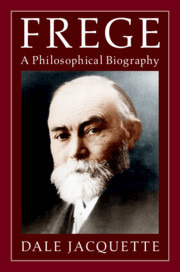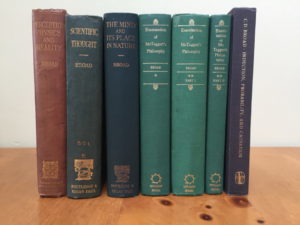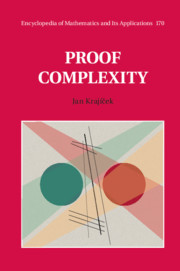Peter Smith's Blog, page 67
April 12, 2019
Jacquette’s Frege
 Oscar Murillo’s terrific new exhibition in Cambridge is called “Violent Amnesia”. And I too have obviously been afflicted by a bad temporary bout of amnesia!
Oscar Murillo’s terrific new exhibition in Cambridge is called “Violent Amnesia”. And I too have obviously been afflicted by a bad temporary bout of amnesia!
It suddenly all came back to me. In 2007, Dale Jacquette published a new translation of Frege’s The Foundations of Arithmetics. And I now recall that it got some of the worst reviews I have ever seen. I’ve checked again. Michael Kremer (at NDPR) initially gently and then with increasing force excoriates the translation as full of sentences and passages that make no sense, and riddled with inaccuracies and egregious errors. And he finds Jacquette’s editorial introduction equally full of quite basic misunderstandings of Frege. Kremer gives damning chapter and verse, more than enough to fully justify his resoundingly negative judgements in the long review. Matthias Schirn in his lengthy review (HPL 2010) is equally negative. He finds, and he is being kind, that Jacquette’s introduction is “fraught with misrepresentations” and his translation “offends over and over against [Jacquette’s] own guiding principle of literal accuracy”: again, there is more damning chapter and verse. Kremer and Schirn’s complaints aren’t at the level of disputable and over-heated rival judgements over the reading of difficult texts: not to put too fine a point on it, they are assertions of the author’s incompetence at a pretty basic level.
Obviously that wasn’t enough to put Jacquette off his efforts at writing about Frege. But it should have been. CUP has just published his Frege: A Philosophical Biography. I’ve now read the first hundred pages or so, tracing Frege’s life up to the point where he writes the Begriffsschrift. This book strikes me, not to put too fine a point on it, as again pretty dreadful.
Let’s set aside the fact that the prose is laboured, repetitive and very longwinded, so the book is twice the length it could ever have needed to be. We don’t need eight almost entirely irrelevant pages on the history of Wismar, Frege’s birthplace. And we most certainly don’t need crass passages like this, prompted by a somewhat conventional family photograph: “From the photographic evidence, it is tempting to imagine dour nights of dutiful romance between Auguste and Karl Alexander in heavy linen night garments. By grudging or joyous fulfilment of an obligation before God they produced first Gottlob and then Arnold.”
But leaden prose apart, what disqualifies Jacquette from seriously engaging with his task of writing about Frege’s early career as a mathematician is his hopeless level of understanding of mathematics. Consider this gem, for example
Most proofs, even in classical times, beginning with Euclid’s famous argument that there is no greatest prime number … are instances of indirect reasoning or reductio ad absurdum.
Most proofs! Ye gods. Or how about this:
Mathematics is hard work. The ideas are usually not difficult, once the relations a mathematical theory is trying to formalize and how the symbol transformation rules are supposed to work have been understood. The rest is all complicated and sometimes ingenious manipulation of signs in your head or on paper.
Oh yes. Algebraic topology or dynamical systems theory is just like that. And so it goes.
It takes Jacquette over a hundred pages to get Frege to the point of writing the Begriffsschrift. What we want to know, by way of an account of Frege’s intellectual formation, is about his training and early work as a mathematician. We get nothing of worth. We have a list of courses taken by Frege — but no real sense of what was in them (though you might like to wonder just what level of confusion it requires to think that taking a course on telegraphy, and noting the binary code of the telegraph key, might incline Frege to “treat every sentence expressing a proposition as exclusively true or false”.) We surely want to know e.g. what the content of a course on analysis might have been (but oh, did you know that “Mathematical analysis is dedicated(!) to the problem of trying to determine the exact area beneath a given curve in two-dimensional space, as well as coping computationally with phenomena that can be geometrically pictures as involving continuously changing values”?).
Jacquette obviously hasn’t a clue what is going on in Frege’s dissertation – he doesn’t pick up at all that it is about complex projective geometry (I suspect he thinks it is about the ordinary Argand plane of elementary maths). And he hasn’t a clue either about what is going on in the supposedly “formidable” Habilitionsschrift, about functional iteration and the finding of solutions to some functional equations. Jacquette goes in for some obfuscating armwaving, but really the reader is left quite in the dark about Frege’s real mathematical world as we reach the epochal 1879. As far as serious intellectual biography is concerned, this is a pretty much a waste of print and of the reader’s time.
I think I’m going to be kind to myself and give the remaining five hundred or more pages a miss.
The post Jacquette’s Frege appeared first on Logic Matters.
April 11, 2019
Oscar Murillo at Kettle’s Yard
The impactful Oscar Murillo exhibition at Kettle’s Yard is definitely worth a visit — themes of loss and displacement, in dramatic large canvases and installations. Impressive.
The post Oscar Murillo at Kettle’s Yard appeared first on Logic Matters.
April 7, 2019
Email notifications
I’ve made some minor under-the-bonnet changes to this site, hopefully not breaking anything in the progress by updating the PHP engine and so forth. An aesthetic upgrade will have to wait till I’m yet older and greyer.
One small addition: in the side bar, you can sign up to get email notifications when there are new posts or new pages. A bit old-fashioned, I know: but some may find this useful! (You can unsubscribe again from the foot of any email you later receive from server.)
The post Email notifications appeared first on Logic Matters.
April 5, 2019
Frege: A Philosophical Biography
 Another new book from CUP, this time Frege: A Philosophical Biography by the late Dale Jacquette.
Another new book from CUP, this time Frege: A Philosophical Biography by the late Dale Jacquette.
I was looking forward to reading this, but I fear that it is going to be hard work, because Jacquette’s prose is (it has to be said) very longwinded and laboured. In the pages I have read so far, the text could — with no exaggeration — have been reduced in length by half, with no loss of content and with considerable gain for the reader. Just for this reason, wading through some 640(!) pages of this is not an entirely happy prospect.
And dipping into some later pages hasn’t made me particularly confident that this is going to be philosophically very insightful either. But we shall see. I would certainly like to learn more about Frege’s mathematical background and early working context, and it looks as if Jacquette has done a lot of homework and has an amount to say about this. I’ll report back!
The post Frege: A Philosophical Biography appeared first on Logic Matters.
April 3, 2019
Taking leave of Broad …
 Of the great Cambridge philosophers in the first half of the last century, C.D. Broad surely remains the most underrated. Partly, I’m sure, that’s to do with his terrific clarity and his good sense (leaving aside that odd interest in psychical research inherited from Sidgwick). There are no theses to be written untangling his obscurities or trying to make sense of apparently dotty views. Read, for example, that remarkable passage from An Examination of McTaggart’s Philosophy that was reprinted in the old Feigl and Sellars reader as ‘The “nature” of a continuant’ which discusses dispositions, essences and natural kinds. This still strikes us as first-rate philosophy. And — read by so many graduate students in the 1950s and 60s — surely sowed some important seeds in the later revival of metaphysics.
Of the great Cambridge philosophers in the first half of the last century, C.D. Broad surely remains the most underrated. Partly, I’m sure, that’s to do with his terrific clarity and his good sense (leaving aside that odd interest in psychical research inherited from Sidgwick). There are no theses to be written untangling his obscurities or trying to make sense of apparently dotty views. Read, for example, that remarkable passage from An Examination of McTaggart’s Philosophy that was reprinted in the old Feigl and Sellars reader as ‘The “nature” of a continuant’ which discusses dispositions, essences and natural kinds. This still strikes us as first-rate philosophy. And — read by so many graduate students in the 1950s and 60s — surely sowed some important seeds in the later revival of metaphysics.
I wrote a shortish encyclopedia article once on Broad as an act of Cambridge piety, and was asked if I’d be interested in writing a much longer piece for the Stanford Encyclopedia. But the occasion wasn’t right, and the time has now passed for me pick up that interest again. I’ve too many other things I’d still like to tackle.
So it has come to this. Faced with the perennial problem of where to shelve books as they mysteriously keep accumulating around the house (I am not the only guilty party here) it is time to acknowledge with regret that Broad is another author I will never return to, and so I need to pass on the handful of his books that I have kept up to now. There they are, in decent condition. They might like to keep each other company for a while yet — so any suggestions for a good home?
The post Taking leave of Broad … appeared first on Logic Matters.
April 2, 2019
IFL2: Chapters on propositional natural deduction, again
This is embarrassingly like Mrs May bringing back her Brexit deal for the n-th time, slightly changed …
But here we go again. This is a slightly revised version of the draft chapters on propositional natural deduction for the second edition of IFL2. (Exercises to be added, which will fill some remaining gaps, like noting the equivalence of DN and Classical Reductio, given the other rules, or dealing with biconditionals.)
To repeat what I have said before, one advantage about basing an intro logic book on trees (as in IFL1) is that people don’t get very exercised about how a tree system should be developed. By contrast, people get decidedly heated about the best form of natural deduction to adopt. But there’s no pleasing everyone!
What I propose is a standard enough Fitch-style system — more standard indeed than in the previous version. I have backtracked from two (connected) deviations in an earlier version, persuaded by the reactions of some — not least David Makinson — that deviating from the straight and narrow path was unwise. I had been minded, in particular, to treat the absurdity sign in natural deduction more in the spirit of an exclamation mark rather than as a wff in its own right (compare the sign used to close off branches in a Smullyan-style tree proof). I still think there are good reasons for doing this — see for example Neil Tennant’s discussion in this paper. However, there are reasons on the other side, and — on further reflection — I do think that there are trumping pedagogic reasons for sticking to a standard presentation in a first-level text book.
So, I hope that these chapters are now in a stable state, at least in terms of approach and detailed shape. But all comments (other than variants on “you have written the wrong book!”), all corrections, and even at this late stage all suggestions for improvement will of course still be very gratefully received, as always.
The post IFL2: Chapters on propositional natural deduction, again appeared first on Logic Matters.
April 1, 2019
Proof Complexity
 Here is another new logic book from CUP, Proof Complexity by Jan Krajíček.
Here is another new logic book from CUP, Proof Complexity by Jan Krajíček.
This is a rather weighty (and very pricey) tome by a distinguished author in a weighty (and distinguished) series. Maybe it is not the place to start if you are new to the area! — but, dipping in, this does look full of interest if you already know some of the issues and themes.
Surely a book, then, to order for your university library. But you can judge for yourself — for the author has (at least for the moment) provided a link to a PDF of a late version of the book here. And there are related materials elsewhere on his website.
The post Proof Complexity appeared first on Logic Matters.
March 31, 2019
Joseph Haydn — born this day, 1732
For a few minutes distraction from Brexit woes, and to mark Haydn’s birthday — and heaven knows how much his music has been a life-saver in the last few years — here is the wonderful Doric Quartet at the Wigmore, playing the Adagio of his Op 20, No. 6 Quartet.
The post Joseph Haydn — born this day, 1732 appeared first on Logic Matters.
March 2, 2019
IFL2: Chapters on propositional natural deduction
Thanks to the kindness of strangers — not to mention some friends and relations (special thanks to The Daughter) — I have an improved version of the four chapters on propositional natural deduction for IFL2. Here they are. (Exercises to be added, which will fill some gaps, like noting the equivalence of DN and Classical Reductio, given the other rules, or dealing with biconditionals.)
One advantage about basing an intro logic book on trees (as in IFL1) is that people don’t get very exercised about how a tree system should be developed. By contrast, people get decidedly heated about the best form of natural deduction to adopt. So I’m probably not going to satisfy even half of those who urged me to go for natural deduction in the second edition. But there’s no pleasing everyone! What I propose is a standard enough Fitch-style system, with one deviation — the v-Elim rule is a Fitchian version of the liberalized rule recommended for Gentzen systems by Neil Tennant. That way we get disjunctive syllogism without relying on explosion. Which has always seemed more “natural” to me.
All comments (other than variants on “you have written the wrong book!”) and all corrections will of course be very gratefully received, as always.
The post IFL2: Chapters on propositional natural deduction appeared first on Logic Matters.
March 1, 2019
Monteverdi, Sì dolce è’l tormento
To distract, for five minutes, from Brexit and other troubles, Lea Desandre and Thibault Cauvin — Monteverdi, Sì dolce è’l tormento.
The post Monteverdi, Sì dolce è’l tormento appeared first on Logic Matters.




